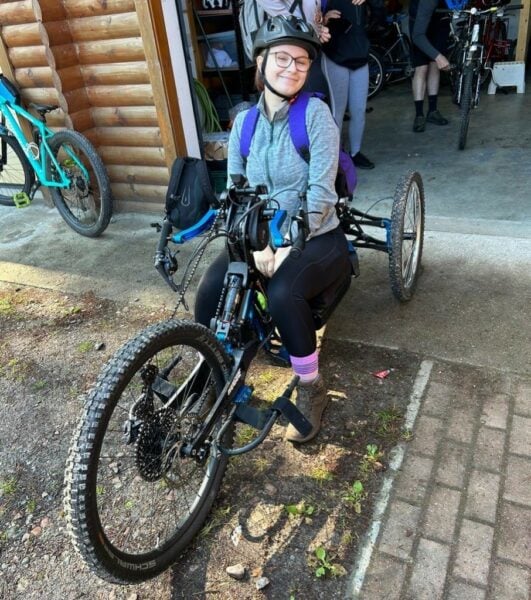Empowering Voices: How Emma found purpose in mental health advocacy
Emma’s passion for politics and campaigning was initially ignited through their Volunteering section. While doing their Gold Award, they joined the Scottish Youth Parliament and were a voice for young people in the area, championing issues around accessibility and inclusion.

During the pandemic, Emma went on to start the charity ‘Project Sonrisa’, a response to their frustration with the lack of support from mental health services and the way the media portrayed young people’s mental health, something they’re a passionate advocate for. The charity’s purpose is to tackle the stigma surrounding mental health by engaging people in the creative arts and encouraging more meaningful conversations.
Emma’s story
I’ve had neurological problems since I was ten, including a tremor in my right leg and chronic back pain, I have involuntary movements and it also affects my balance. The main problem is that I can’t walk very far or stand for long periods of time. I also have endometriosis, so if the expedition had fallen when I was on my period I would have struggled to take part.
With my health condition, I didn’t think it was possible to do my Gold DofE. It wasn’t until I found out that North Lanarkshire Council had a specific group for young people who needed additional support that I found out I could take part.
During COVID I was really frustrated with the lack of support for mental health services and the way it was presented in the media, particularly seeing students’ mental health deteriorating. I started a virtual choir and it evolved from there.
The aim of Project Sonrisa is to use the arts to help people with their mental health, taking an intersectional approach and recognising we don’t live in a binary world. We recognise that lots of topics overlap but everyone experiences things differently.
We’re a youth-led charity, so the whole board consists of young people. I started Project Sonrisa when I was 16 and it was quite difficult for me to do it but when you’re passionate about something, you can do it if you put your mind to it.
It’s been difficult for me to get to this point in my life. I was bullied in high school; people didn’t think I’d be able to do things but that just fuels me and drives me forward. I’m doing the opposite of what other people expected me to do.
I used to be quite a shy and reserved person; I wasn’t as confident as I am now. Through my DofE, my charity work and my role in the Scottish Youth Parliament I’ve developed a passion for campaigning and politics.
DofE has been one of the most accessible youth organisations I’ve been involved with and that has really helped me to feel less alone. Living with chronic illness can be a very isolating experience but being able to do adapted Gold DofE has helped me to relate to others and challenge my own negative perceptions of myself.
Emma’s mental wellbeing tips
Mental Health Awareness Week is an opportunity for us all to tackle stigma and help people understand and prioritise their mental health.
Here are my tips for keeping on top of my mental wellbeing:
1. Get outside
Going on a short walk or just sitting outside can do wonders for your mental wellbeing. If that seems too overwhelming, then open your bedroom window and let some fresh air in!
2. Keep learning
Whether it’s reading a good book, signing up to a free online course or getting someone to teach you a new skill. Learning makes me feel accomplished, productive and confident and it’s a great way to feel good about something you’ve done.
3. Put a photo of your younger self on a mirror
It may seem like a funny one but when I’m looking at myself in a mirror and I see younger me it reminds me to be kind to myself. Speak to yourself like you would to your inner child.
For further support, check out the following organisations:
The DofE charity strives to continue our work on improving mental wellbeing in young people and making DofE programmes more accessible, but this can only continue with your support. Please consider making a donation:
Donate to the DofE




